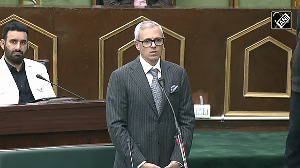Former world 100 metres record holder Tim Montgomery became on Tuesday the highest profile culprit after a U.S. federal investigation into the BALCO laboratory doping conspiracy.
The Court of Arbitration for Sport (CAS) banned Montgomery and Chryste Gaines for two years each from June 6 this year after accepting evidence that the pair had taken the designer steroid THG (tetrahydrogestrinone).
In addition Montgomery will forfeit all his results and earnings from March 31, 2001, through to June 6 while Gaines will have her results annulled and lose her winnings from November 30, 2003, up to the same date.
CAS said those were the dates when both athletes told double world sprint champion Kelli White that they had been taking THG.
Montgomery, 30, the former partner of triple Olympic champion Marion Jones, won $100,000 alone after setting his then world record of 9.78 seconds at the 2002 Paris grand prix final.
A CAS statement on Tuesday said the U.S. Anti-Doping Agency (USADA) submitted evidence that BALCO had been involved in a conspiracy to distribute undetectable performance-enhancing drugs.
Agents from the U.S. Internal Revenue Service criminal investigations unit raided the laboratory in California on Sept. 23, 2003.
A CAS statement said the (USADA) had sought a four-year ban for Montgomery for taking part in a world-wide doping conspiracy initiated by BALCO.
"According to USADA, BALCO was involved in a conspiracy, the purpose of which was the distribution and use of doping substances and techniques that were either undetectable or difficult to detect in routine drug testing.
"BALCO is alleged to have distributed several types of doping agents to professional athletes in track and field, baseball and football.
"Among these were (THG), otherwise known as 'the clear' that could not be identified by routine anti-doping testing until 2003."
POUND ASTONISHMENT
World Anti-Doping Agency (WADA) president Dick Pound welcomed the decision, which was based on legal evidence about doping rather than a positive sample.
"We now have driven the stake through the heart of the argument that you have to have an analytical positive in order to have a doping infraction, or a confession," Pound told Reuters in a telephone interview from his Montreal office.
Pound also expressed astonishment that Montgomery had not given evidence to CAS.
| |||||||||||
CAS accepted evidence from White that both athletes had admitted using THG.
Last year White was suspended for two years last year after admitting using banned drugs, including THG and the blood booster EPO (erythropoietin). She promised to co-operate with USADA to help clean up her sport.
"Having seen Ms White and heard her testimony...the members of the panel do not doubt the veracity of her evidence," CAS said.
USADA chief executive officer Terry Madden said the decision invalidated more than six years of competitive results.
"It is always a great day for clean athletes when individuals who cheat are held accountable and stripped of the rewards gained through doping," Madden said.
Lawyer Howard Jacobs, who represented Montgomery before CAS, questioned CAS's reasoning.
"I was a little disappointed in the reasoning of the decision. Basically the entire decision is based on the supposed admission to Kelli White, which there really was no admission," Jacobs told Reuters.
"I am concerned about a doping offence based on one athlete's testimony about what another athlete supposedly said. That is a dangerous precedent to set."
Thirteen track and field athletes had been sanctioned before Tuesday's announcement as a result of the BALCO scandal. White, twice Olympic 4x400 metres relay gold medallist Alvin Harrison and 2003 world indoor 200 metres champion Michelle Collins also received bans for non-analytical positives.
(Additional reporting by Gene Cherry in Raleigh, North Carolina)







 © 2025
© 2025